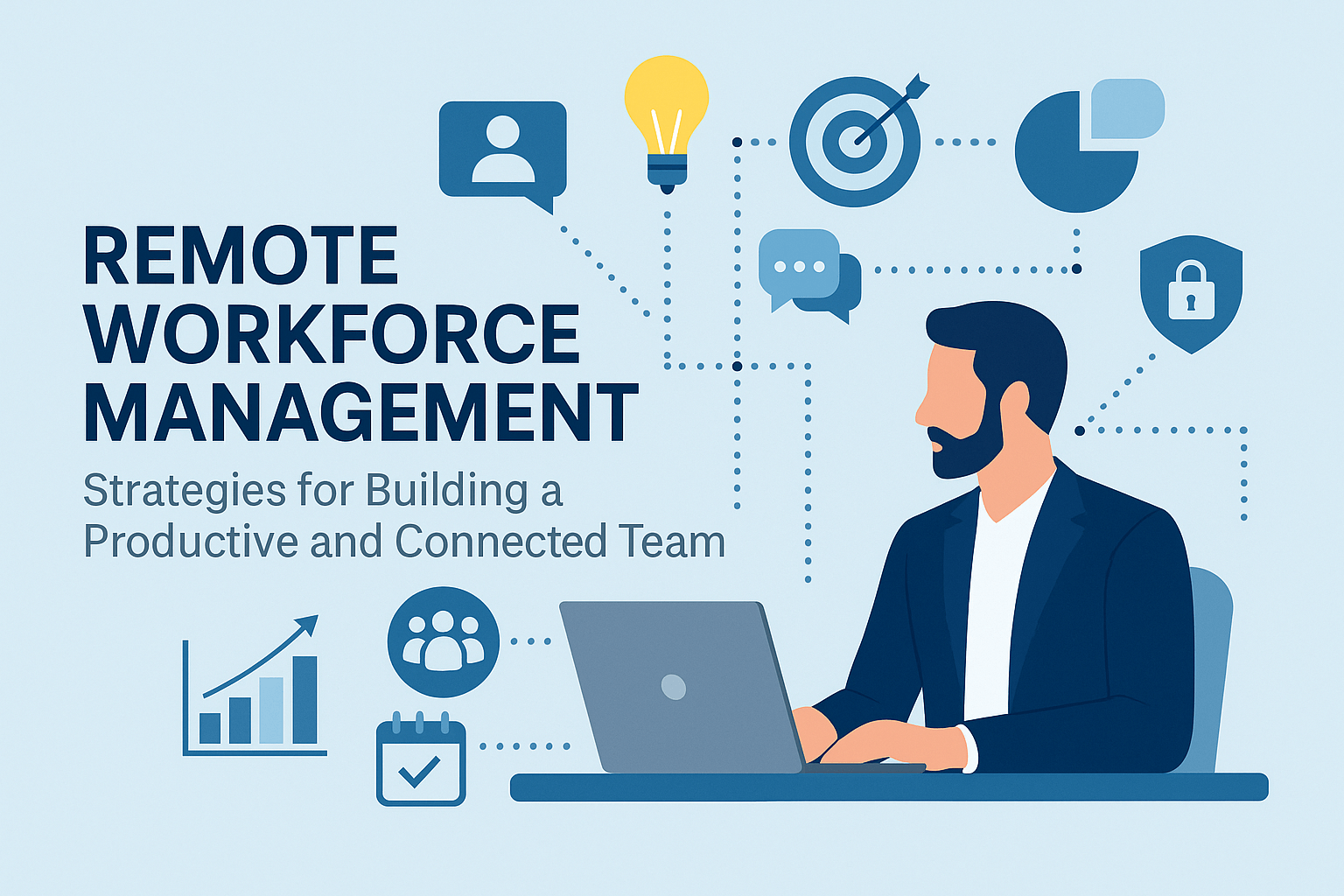The modern workforce is no longer confined to office walls. Today’s organizations are powered by distributed teams working from multiple locations, time zones, and devices. This shift has redefined how leaders manage, communicate, and measure performance — giving rise to a new business priority: effective remote workforce management.
For companies striving to stay competitive, the ability to manage remote teams efficiently is no longer optional, it’s a strategic necessity. As a business consulting firm that helps organizations build scalable systems and optimize people operations, ESO Consultants explores how to create a sustainable, high-performing remote work structure that aligns with your business goals.
What Is Remote Workforce Management?
Remote workforce management refers to the systems, tools, and strategies used to coordinate, engage, and support employees who work outside the traditional office. It covers everything from communication frameworks and technology integration to performance monitoring and company culture.
At its core, remote workforce management ensures that productivity, collaboration, and accountability remain strong — regardless of physical distance.
Why It Matters Now More Than Ever
The post-pandemic business landscape has solidified remote and hybrid work as the new norm. Companies now hire talent across cities, countries, and even continents. While this opens up access to a broader talent pool, it also introduces new management challenges — from communication gaps to performance inconsistencies.
Effective remote workforce management ensures:
- Operational efficiency: Teams remain aligned and productive despite distance.
- Employee engagement: Workers feel connected, valued, and supported.
- Cultural cohesion: Company values and purpose remain visible to everyone.
- Scalable growth: Systems and workflows adapt seamlessly as teams expand.
Common Challenges in Managing a Remote Team
1. Communication Barriers
Without face-to-face interactions, miscommunication can occur easily. Teams may experience delays in decision-making or unclear task ownership.
2. Lack of Accountability
When work becomes asynchronous, tracking progress and performance without micromanaging can be tricky.
3. Cultural Disconnect
Remote setups can dilute company culture. Employees may feel isolated, especially if the organization doesn’t actively reinforce inclusion and connection.
4. Tool Overload
Using too many digital tools can create confusion and fatigue. The key is integration — not volume.
5. Security Risks
Remote work increases exposure to cybersecurity threats, requiring strong digital protection systems.
Core Strategies for Successful Remote Workforce Management
1. Build Clear Structures and Expectations
Define each team member’s responsibilities, key performance indicators (KPIs), and reporting frameworks. Clarity eliminates confusion and fosters accountability.
Tip: Use documented standard operating procedures (SOPs) so everyone follows a unified process.
2. Leverage the Right Technology
Technology forms the backbone of remote operations. Invest in platforms that enhance visibility and streamline communication.
Recommended Tools:
- Collaboration: Microsoft Teams, Slack, Google Workspace
- Project Management: Asana, Trello, ClickUp
- Video Conferencing: Zoom, Meet, Webex
- HR & Payroll: Deel, BambooHR, Rippling
ESO Consultants helps clients integrate these tools strategically into existing workflows for maximum efficiency.
3. Emphasize Communication and Transparency
Successful remote teams operate on clear and consistent communication. Establish guidelines for:
- Daily team updates
- Weekly progress meetings
- Monthly performance reviews
Encourage an open-door policy digitally — where feedback flows both ways.
4. Focus on Outcomes, Not Hours
Modern workforce management should be performance-driven. Instead of tracking screen time or online status, measure outcomes against agreed goals. Empower teams to take ownership of results while enjoying flexibility.
5. Foster a Strong Digital Culture
Culture doesn’t fade in remote work — it evolves. Host virtual town halls, celebrate achievements online, and encourage casual team interactions. When employees feel connected to the mission, engagement and retention soar.
6. Train Managers for Remote Leadership
Managing a distributed team requires emotional intelligence and adaptability. ESO recommends regular training for leaders on:
- Virtual communication
- Conflict resolution
- Cross-cultural management
- Performance coaching
A strong manager is the bridge between remote operations and company vision.
7. Implement Secure and Scalable Systems
Protecting company data is critical. Use encrypted communication tools, multi-factor authentication, and secure file-sharing platforms.
ESO Consultants assists clients in designing data-safe remote infrastructures aligned with compliance standards and industry regulations.
The Role of Data in Remote Workforce Optimization
Data-driven insights are transforming workforce management. From productivity analytics to engagement metrics, data helps leaders identify patterns, improve performance, and allocate resources strategically.
ESO Consultants leverages digital workforce analytics to help organizations:
- Track project efficiency in real-time
- Detect potential burnout early
- Optimize team structures based on data
- Improve decision-making through measurable insights
Future Trends in Remote Workforce Management
The future of work will be a blend of human intelligence and digital automation. As AI tools become integrated into business operations, remote management will become smarter, predictive, and more personalized.
Key trends include:
- AI-powered scheduling and productivity tools
- Virtual reality collaboration platforms
- Advanced data dashboards for employee engagement
- Flexible hybrid models that prioritize outcomes over presence
Organizations that embrace these innovations early will build more agile, adaptive, and competitive teams.
How ESO Consultants Can Help
At ESO Consultants, we help businesses navigate the complexities of managing remote and hybrid teams. Our Workforce Strategy Consulting service focuses on:
- Designing efficient remote operations models
- Streamlining HR and performance systems
- Building a unified digital culture
- Integrating the right technology for seamless collaboration
We partner with forward-thinking organizations to turn remote work into a strategic advantage, not just a necessity.
Conclusion
Remote workforce management isn’t just about adapting to change; it’s about leading it. Organizations that implement structured systems, empower employees, and use data-driven insights will thrive in the digital-first economy.
As work continues to evolve, ESO Consultants stands ready to help companies design the future of workforce management — one built on trust, technology, and transformation.

